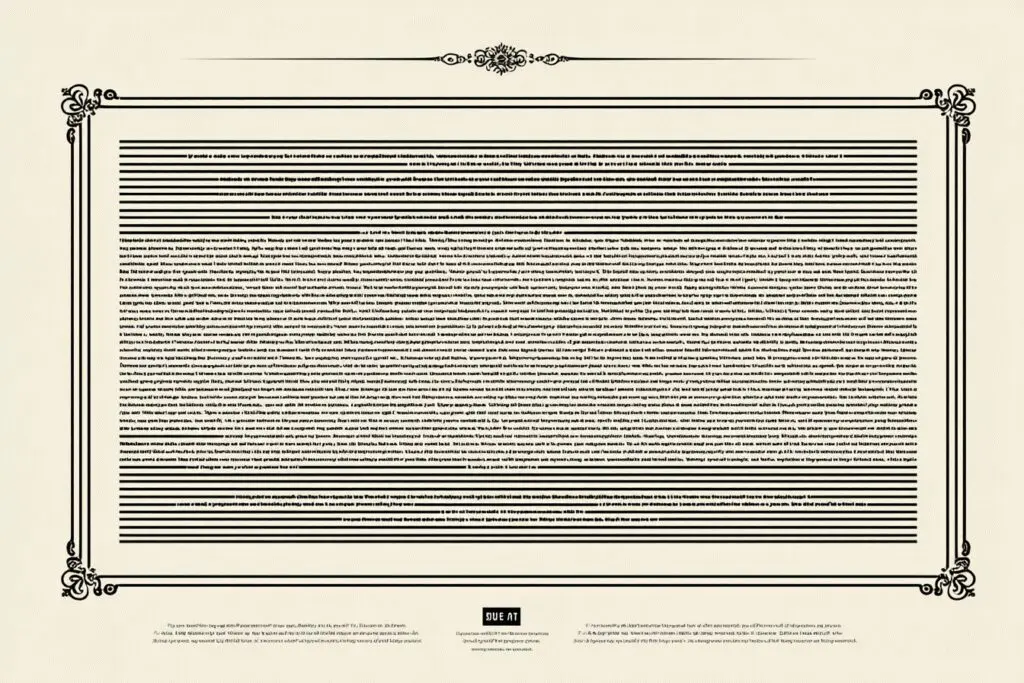Have you ever felt a Bible verse change your heart? It’s a powerful feeling. You find a passage that speaks directly to you. It brings comfort. It gives you strength. You want to share this feeling with everyone. But when you try, something gets lost. The quote doesn’t have the same impact. It feels flat. Why does this happen? Learning how to quote Bible Verses is more than an academic skill.
It is a spiritual practice. It connects us deeper to the Word. It also helps us share God’s truth effectively. I spent years feeling like I was missing something. My quotes were accurate, but they lacked life. Then, I learned it wasn’t just about the words. It was about the heart behind them. It was about context and reverence. This is the secret method. It’s about sharing a piece of God’s heart, not just a line from a book.
More in Bible Category
Where Should a Woman Start Reading the Bible
How to Cite the Bible Chicago Style
Key Takeaways
- Accuracy is Essential: Always double-check the book, chapter, and verse. Precision shows respect for the Word.
- Context is King: A verse without its context can be misunderstood. Always read the verses before and after.
- Your Heart Matters: Your reason for sharing a verse is important. Share to uplift and encourage, not to argue.
- Integration is Key: Learn to weave verses into your own sentences. This makes them feel more natural and personal.
- Choose a Good Translation: Pick a Bible translation that is clear and faithful. The right version can make a big difference.
Why Does Quoting the Bible Correctly Even Matter?
Sometimes we think the details are not important. As long as the message gets across, right? I used to think that way. But I learned that how we handle God’s Word says a lot about our faith. It shows our respect for the source of our hope. It honors God Himself.
Think of it like handling a precious gift. You wouldn’t be careless with it. You would treat it with love and attention. The Bible is God’s gift to us. Every word is inspired. So, taking the time to quote it correctly is an act of worship. It tells God, and others, that you value His message deeply.
Is It Just About Getting the Words Right?
No, it goes much deeper. Getting the words right is the first step. It is the foundation. But the real goal is to convey the true meaning. The Bible is not a collection of magic phrases. It is a living, breathing testimony of God’s love for us.
When we quote a verse, we are handling something holy. So, we should do it with care. It’s about understanding the author’s original intent. It’s about feeling the weight of the history behind the words. This care ensures we don’t accidentally twist God’s message to fit our own.
How Can a Single Quote Truly Change Someone’s Day?
Words have power. God’s words have divine power. I remember a time I was feeling completely lost. A friend sent me a simple text. It contained just one verse: Isaiah 41:10.
- “So do not fear, for I am with you.”
- “Do not be dismayed, for I am your God.”
- “I will strengthen you and help you.”
- “I will uphold you with my righteous right hand.”
That verse, quoted perfectly and sent with love, was a lifeline. It wasn’t just a string of words. It was God speaking directly to my heart through a friend. That is the power we have when we learn how to quote Bible verses with purpose and love. It can be a beacon of hope in someone’s darkness.
What Are the Basic Rules for Quoting Bible Verses?
Before we get to the heart of it, we need to know the rules. These are the technical parts. They are simple to learn. But they are very important for clarity. Following these rules makes your writing look clean. It also helps people find the verse for themselves.
Think of these rules as the grammar of Scripture sharing. They provide a common language for all believers. When everyone uses the same format, it prevents confusion. It makes communication about God’s Word smooth and easy.
How Do I Correctly Write the Book, Chapter, and Verse?
This is the standard format everyone should know. It is clear and universally understood. You will use it constantly in your notes, messages, and studies.
The format is: Book Chapter:Verse.
For example, the most famous verse in the Bible is written as John 3:16.
First, you write the name of the book (“John”). Then, you write the chapter number (“3”). After that, you place a colon (:). Finally, you write the verse number (“16”). There is no space around the colon. It is that simple.
Should I Use Abbreviations for the Books of the Bible?
Yes, using abbreviations is very common. It saves space. It also makes your writing look neat. However, you need to use standard abbreviations. Using your own can cause confusion. Most Bibles have a list of abbreviations in the front.
Here are some common examples:
- Genesis – Gen.
- Exodus – Ex.
- Psalm – Ps.
- Proverbs – Prov.
- Matthew – Matt.
- Romans – Rom.
- Philippians – Phil.
When you are writing for a wider audience, it can be helpful to write out the full book name the first time. Then you can use the abbreviation later. This helps people who might be new to the Bible.
What About Quoting Multiple Verses Together?
Often, one verse is not enough. You need to include a range of verses to get the full thought. There are simple punctuation rules for this. They help you show the exact range you are referencing.
- For a continuous range of verses, use a hyphen (-). For example, Romans 8:38-39 includes both verse 38 and verse 39.
- For separate, non-continuous verses in the same chapter, use a comma (,). For example, 1 Corinthians 13:4, 7 refers to verse 4 and verse 7, but not the verses in between.
You can also combine these. For instance, Ephesians 2:8-10, 13 would mean you are quoting verses 8 through 10 and also verse 13. This system is very flexible. It allows you to be precise with your references.
How Do You Go Beyond the Basics to Master Quoting?
Now we move from the rules to the relationship. This is the “secret method.” It’s where quoting the Bible becomes an art form. It’s about more than just being correct. It’s about being effective. It’s about being transformative.
This part of the journey requires your heart. It requires prayer and patience. You will learn to see verses not just as text, but as windows into God’s character. This is how you share Scripture in a way that truly changes lives. It is the difference between quoting a book and sharing a message from the living God.
Have You Ever Considered the Full Context?
This is the single most important principle. I cannot stress this enough. Taking a verse out of context is one of the biggest mistakes we can make. I have done it myself. For years, I loved Philippians 4:13. “I can do all things through Christ who strengthens me.” I used it for everything. I thought it meant I could be good at sports or pass any test.
But then I read the whole chapter. Paul was talking about being content. He could be content whether he was hungry or well-fed. He could be content whether he had a lot or a little. The strength was for enduring hardship, not for personal gain. That discovery changed everything for me. It taught me that context is king. Before you quote any verse, ask yourself these questions:
- Who wrote this book?
- Who was the original audience?
- What was the main message of the chapter?
- How does this verse fit into the surrounding story?
Answering these questions will protect you from misusing God’s Word. It will also give your quotes a depth and power they never had before. For deeper study on this, Dallas Theological Seminary offers some excellent free online courses that can help you understand biblical context.
Which Bible Translation Should You Actually Use?
The Bible was originally written in Hebrew, Aramaic, and Greek. The English Bibles we read are translations. And there are many of them. The translation you choose can affect how you understand and quote a verse.
There is no single “best” translation for everyone. Different versions have different strengths.
- King James Version (KJV): This is a classic and beautiful translation. Its language is poetic but can be hard for modern readers to understand.
- New International Version (NIV): This is one of the most popular versions. It is known for being easy to read and understand. It balances readability with accuracy.
- English Standard Version (ESV): This translation is more literal. It stays very close to the original wording. It is great for deep study.
- New Living Translation (NLT): This version focuses on conveying the overall thought. It is very easy to read and is great for devotional use.
I personally use the ESV for study and the NIV for sharing with others. My advice is to find a translation that you connect with. Read a few different versions of your favorite passages. See which one speaks to your heart most clearly.
How Can You Weave a Verse into Your Own Words?
Sometimes, just dropping a quote can feel jarring. It can interrupt the flow of your writing or conversation. A more graceful way to share Scripture is to integrate it. Weave it into your own sentences. This makes the message feel more personal and natural.
Instead of saying: “We should love each other. John 13:34 says, ‘A new command I give you: Love one another.'”
You could try weaving it in: “Jesus gave us a clear direction for our lives when He commanded us to ‘love one another’ just as He has loved us (John 13:34).”
See the difference? The second example flows smoothly. It feels less like a lecture and more like a heartfelt thought. The reference is still there in parentheses. This allows people to look it up. This technique takes practice. But it is a powerful way to make your sharing of Scripture feel more authentic and connected.
What Are Some of the Most Common Mistakes to Avoid?
Learning what not to do is just as important as learning what to do. We all make mistakes. I have made every single one on this list. But learning from them has made my faith stronger. It has also made me a more responsible steward of God’s Word.
Being aware of these common pitfalls can help you avoid them. It will protect your integrity. It will also ensure that your message is always honoring to God. Let’s look at a few of the most common errors.
Are You Taking Verses Out of Context?
We have already talked about this. But it is so important that it is worth repeating. This is the number one mistake people make. It is often done with good intentions. We find a verse that seems to support what we want to say. So, we use it.
But the Bible is not a grab-bag of inspirational quotes. It is a unified story. Every verse is part of a larger narrative. Jeremiah 29:11 is a classic example. “For I know the plans I have for you… plans to prosper you.” We often use this to talk about personal success. But Jeremiah was writing to the Israelites in exile. The promise was for the nation, and its fulfillment was many years away. The context adds a much deeper, more communal meaning. Always, always check the context.
Are You Using Quotes to Win Arguments?
This one hits close to home for me. In my younger days, I used the Bible as a weapon. During a disagreement, I would pull out a verse that I thought proved my point. I thought I was defending the truth. But really, I was just trying to win. I was using God’s Word to elevate myself over someone else.
The Bible should be a source of healing and reconciliation. It should not be a hammer to beat people with. Paul tells us in 2 Timothy 2:24 that “the Lord’s servant must not be quarrelsome but must be kind to everyone.” Our goal in sharing Scripture should be to show love. It should be to build people up, not tear them down. Before you share a verse in a debate, ask your heart: Am I doing this to help, or to hurt? The answer will guide you.
Your Journey with the Word
Learning how to quote Bible verses is a lifelong journey. It is not something you master overnight. It is a process of growing closer to God. It is about letting His Word shape your mind and your heart.
Be patient with yourself. You will make mistakes. But every step you take is a step toward a deeper relationship with Jesus. The goal is not perfection. The goal is connection. It is about connecting with God on a deeper level. And it’s about helping others connect with Him too.
So keep reading. Keep studying. Keep sharing. Let God’s Word be a lamp for your feet and a light on your path. As you treat His Word with the reverence and care it deserves, you will find that it brings new life not only to others, but also to you. It’s a beautiful journey. And it’s one I am so glad we get to be on together.
Frequently Asked Questions – How to Quote Bible Verses

What are common mistakes to avoid when quoting Bible verses?
Avoid quoting out of context, forgetting to include the version, misplacing punctuation, and paraphrasing inaccurately, as these mistakes can misrepresent the scripture’s original message.
What is the best way to smoothly incorporate Bible quotes into my writing?
Introduce the quote with a context or lead-in sentence, then explain its meaning afterward to connect it seamlessly with your message, making the quote feel like a natural part of your writing.
How can I correctly include punctuation and citations when quoting Bible verses?
You should use ellipses (…) to indicate omitted words, brackets [ ] to show added or changed words, and always include a clear citation with the book, chapter, verse, and version in parentheses after the quote.
What are the proper ways to quote short and long Bible passages?
For short passages, you should weave the verse into your own sentence using quotation marks, while longer passages (four lines or more) should be formatted as a block quote, indented and without quotation marks, with the citation at the end.
Why is it important to quote Bible verses accurately?
Quoting Bible verses accurately is crucial because it preserves the original meaning, respects the text as God’s word, ensures clarity for your readers, and prevents misinterpretation or proof-texting that can distort the message.




